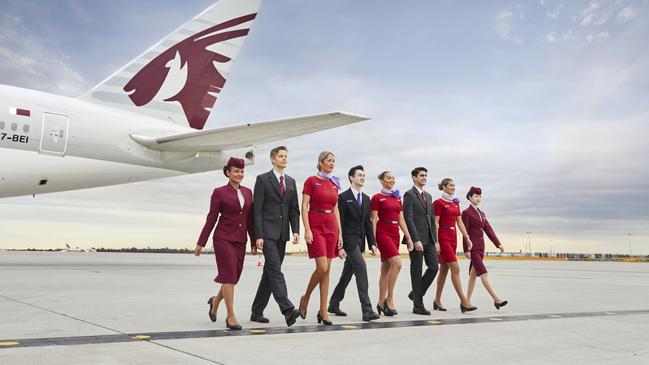Virgin’s sale of Qatar operated flights represent the first shots in a much needed airfare war
Virgin’s much anticipated launch fares on Qatar Airways flights are now on sale, with its CEO declaring the airline is targeting Australians ‘hungry to travel’ who can’t afford exorbitant prices of rival carriers.
The launch of ticket sales on Virgin Australia’s “new” long haul international flights operated by Qatar Airways, potentially signals the start of something travellers have not seen for years – a fare war.
With economy fares of under $2000 return for one-stop flights into Europe from Sydney, Brisbane or Perth in the peak northern summer season, Virgin and Qatar have laid down the gauntlet to rivals Qantas and Emirates.
Business class fares – when they are successfully loaded into Virgin’s ticketing system – are expected to be similarly competitive, at under $10,000 return and possibly even as low as $8000 return for Perth-Paris.
Pressure on Qantas and Emirates prices
In contrast codeshare partners Qantas and Emirates typically charge from $12,000 return in business class on routes such as Sydney-London and Brisbane-Rome in the June to August period, with no indication of those prices falling anytime soon.
Indeed Emirates is so confident of filling its A380s and Boeing 777s on routes from Australia into Europe, it hasn’t even bothered with fare sales in the last few years.
Qantas on the other hand does promote international fare sales from time to time, but typically to North America or into Asia where competition is much more fierce.
On European routes, which are mostly operated by partner Emirates, Qantas firstly has less control – and secondly, the routes Qantas does fly, are unique.
Flying non-stop from Perth to Paris or Perth-London is something no other airline has yet been able to emulate, and as such Qantas makes no secret of the fact those fares come at a 20 per cent premium.
What it means for Qantas Frequent Flyer program
Another factor in the mix is the Qantas frequent flyer program, which for all its flaws, maintains an iron grip on the loyalty of thousands of Australian travellers.
Executive Traveller editor David Flynn says the value placed on earning points and status credits with Qantas means many loyalists will continue to pay the extra.
“There’s only a few thousand (dollars) between them now but it is still hard to imagine Qantas and Emirates won’t respond (to Qatar and Virgin) with a sale of their own,” says Flynn.

Beyond the airlines’ themselves, there’s another factor to consider and that’s the ongoing red hot demand for international travel.
Low-cost airlines Jetstar, AirAsia, Scoot record numbers
Airports report “record international passenger numbers” booked to fly overseas in December and January, with figures exceeding even 2019 levels, in contrast to domestic travel which continues to lag behind.
But before you ask “what cost of living crisis?” consider this.
An increasing number of these overseas travellers are booking with low cost carriers, think Jetstar, AirAsia, Scoot and Cebu Pacific — now enjoying their highest market share out of Australia on record, at over 20 per cent.
Qantas subsidiary Jetstar leads the pack, with 12.8 per cent market share, up from 9 per cent five years ago, thanks largely to the huge numbers of Australians flocking to Bali and Japan.
In fact Bureau of Statistics data for October, showed the UK slipping from fourth to fifth on the table of Australians’ most visited destinations, as Japan moved up to third.
It’s hard to see how the Virgin-Qatar partnership might change that landscape with another 28 flights a week into the Middle East, but you can bet Qantas will be watching very closely.
If there’s anything we’ve learnt about the flying kangaroo in recent years, it’s that it loves a contest and it won’t tolerate any loss of market share, especially to a smaller rival.
Bring on the fare war.






To join the conversation, please log in. Don't have an account? Register
Join the conversation, you are commenting as Logout